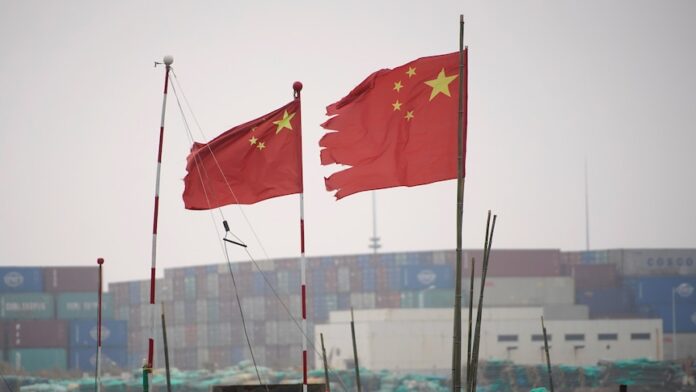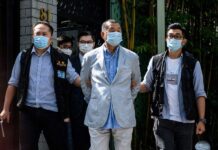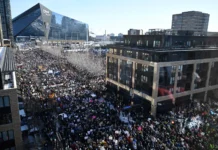Xi Jinping promised the “China Dream” but the economic reality has become a nightmare. In this Editorial feature we present three articles addressing the state of China’s economy.
Socialist magazine editorial part 1 of a 3-part series
When President Biden called China’s economy a “ticking time bomb” he was uncharacteristically bang on the mark. Most Western capitalist ‘experts’ still lag way behind in their appreciation of the depth and severity of the crisis afflicting the economy and Xi Jinping’s dictatorial capitalist regime. Blinded to some extent by Beijing’s official GDP data, which significantly exaggerates economic growth, many commentators see the current crisis as cyclical in character: a weak recovery following the excruciating three-year pandemic aggravated by Xi’s fanatical Zero-Covid policies.
But China’s malaise is structural, not cyclical. The CCP regime’s debt-driven state capitalist economic model has broken down. The results are: (i) a debt crisis, especially at the local government level, which has been the main driver of investment in China, (ii) falling consumption under the impact of unemployment, wage cuts, and insecurity as the property sector and the value of houses implode, and (iii) historic levels of overproduction and overcapacity spurred on by Xi Jinping’s pet project to build out the “new quality productive forces”, which has unleashed brutal price wars and pushed the economy deeper into deflation. These are all features of ‘Japanification’ of which we have warned for many years.
Contemporaneously, the era of neoliberal capitalist globalization is over, giving way to a new era of imperialist bloc confrontation, war alliances and economic protectionism. The sharpening conflict between Beijing and Washington, as the two centres of this global power struggle, exerts additional and severe external pressure on Xi’s regime, amplifying the above-mentioned internal pressures.
The US-led strategy to cut off China’s access to high-end computer chips and manufacturing equipment is set to tighten again later this year. The decoupling of supply chains is accelerating. Today’s economic protectionism flows along channels carved out by geopolitics – the imperialist bloc conflict, with diminishing trade and investment between the two blocs and more within them.
Here, we can definitely speak of a ‘pressure cooker’ development for Xi’s regime, which will inevitably be transmitted from the economic and geopolitical plane into a more explosive pattern for domestic politics. The dictatorship’s attempts to at all costs maintain “stability” (weiwen) by stepping up repression and censorship will ultimately be no more successful than its efforts to steady the economic ship and revive “confidence”.
Xi, the reformer?
The signs of new tensions within the seemingly omnipotent dictatorship were detectable during the CCP’s Third Plenum meeting in July. Unusually, the plenum’s final statements contained fewer references to Xi Jinping and his “Thought”, compared to previous top gatherings. This looks like an attempt to lower Xi’s overbearing profile as a defence mechanism as the mercury of popular discontent rises higher and higher.
A single incident may reveal a certain shift even in the top echelons of the CCP-state, where hitherto Xi has swept all opposition aside. At the start of the Third Plenum, Xinhua published a commentary, “Xi Jinping the reformer”, presumably intended to boost his authority as the meeting convened. The article, which presented a fictitious hagiographic history of Xi’s role in the early years of Deng Xiaoping’s pro-capitalist reform policy, was hastily deleted and expunged from the internet. According to veteran China reporter Katsuji Nakazawa in Nikkei Asia (29 August), the withdrawal of the article was “highly unusual”, reflecting miscalculation and overreach by Xi and his aides. This triggered a huge backlash and “particularly vociferous criticism from retired party elders and ‘second generation reds’”, which then pervaded the atmosphere of the Third Plenum, according to Nakazawa.
Marxists have analysed China’s economic and political crisis extensively in the pages of Socialist magazine as part of our continual updating of perspectives for Chinese and world capitalism. While the entire global system of capitalism is wracked by economic and political crisis, China’s predicament is right now the most serious of all the major economies.
Again on the CCP’s “reserves”
As we go to print, foreign banks and capitalist analysts, among them Goldman Sachs and USB, are downgrading their growth predictions, with many saying Beijing’s “around 5 percent” GDP target is out of reach unless there is major stimulus. On the last point, the clamour is growing louder. But the capitalists have not asked themselves why Xi’s regime so stubbornly refuses to reach for the “bazooka” and juice up the economy with a new version of Wen Jiabao’s 2008 stimulus package, “which saved the world”.
Instead, Beijing’s policies have been incremental – a drip feed of piecemeal measures such as those for the property sector, which have failed to make any impact. If, as some other left organisations theorise, the CCP-state by virtue of its much greater control of the banking system can summon up miraculous “reserves” that are not available to other capitalist regimes, why don’t they do this today? Clearly, the crisis is much more serious for China than was the case in 2008. The answer is that the debt mountain created by that and several subsequent “flood-like stimulus” packages now weighs down upon the economy and limits the regime’s room to manoeuvre.
The three-year property slump is not only continuing, but the pace has accelerated in 2024, with sharper falls in investment, house sales, and an expanding number of big developers needing life support. In August, China Vanke, a partly state-owned property developer and one of the biggest, reported a half-year loss for the first time in more than two decades.
The mobilization in February of the ‘national team’ of state financial institutions, following a direct intervention by Xi, to buy up stocks as a way to put a floor under the falling stock market, also looks like a costly failure. While we may never know how many billions of yuan has been wasted, the overall value of Chinese stocks is back where it was before the intervention was ordered. The stock market is on course for a fourth consecutive year of losses, totalling more than US$6 trillion since 2020, which is a reflection of the wider mood of deep pessimism about the economy.
The suddenness of China’s economic reversal is startling. It’s like a high-speed train that has hit the emergency brakes, throwing everyone to the ground, in the words of an unemployed financial sector worker. Last year, the construction sector shed ten million workers – one-fifth of the total. But the jobs crisis affects every sector, with the “curse of 35” hovering over IT and other white-collar jobs. Workers dread this increasingly common practice whereby bosses layoff staff when they reach this age, to replace them with cheaper younger recruits from the massed ranks of the unemployed.
Gig economy
The partial exception to this trend is the ‘gig economy’ where over 200 million (23 percent of China’s workforce) are now working. This sector plays the role of a last-resort employment ‘sponge’, absorbing the young jobless and those laid off from other sectors, but under abysmal, high-stress conditions, with minimal or zero pension and medical cover.
This sector has become the “new normal” in China according to the South China Morning Post. As more workers are driven to temporary and precarious ‘gig’ work, there is huge downward pressure on wages and general conditions. Data from the International Labour Organisation show that between 2018 and 2021, the number of food delivery workers in China with a formal labour contract halved from 43.3 to just 20.7 percent, while the number of workers who had no contract at all reached 41.6 percent in 2021. In cities like Beijing and Chengdu only around one-fifth of gig economy workers are covered by a pension plan.
Seventeen million young people (under-25s) were unemployed in July, according to official data, which significantly understates the real level of youth unemployment. By comparison, the number of under-25s unemployed in the European Union is 2.8 million, only one-sixth of China’s level. This has created a generation of “rotten tail kids”, according to the latest slang on social media, which equates the young jobless with the millions of unfinished and abandoned “rotten tail houses” – buildings without windows, electricity and running water – that blight cities across the country in the wake of the property crash.
According to the South China Morning Post, fourteen of China’s 23 biggest companies have downsized their workforce in the past year. This newspaper investigated the top companies in five sectors – real estate, internet, automotive, finance and electric vehicles – and found them, “almost universally reducing headcounts and slashing salaries.”
Alibaba cut its payroll by 12.8 percent and Poly Real Estate by 16 percent. “Earlier this year, ByteDance, JD.com, Kuaishou Technology, Didi Chuxing, Bilibili and Weibo all initiated layoff plans”, the report stated. In the motor industry, where a savage price war is underway, China’s biggest domestically-owned EV makers, including Li Auto, Xpeng, and Nio, all made cuts in staffing levels in the past year.
The SCMP’s report also highlighted a divergence in the behaviour of state and private corporations, with the former cutting salaries and other labour-related costs while the latter have carried out layoffs. Last year, one in three white-collar workers took a pay cut, and in a survey nearly 50 percent said they were afraid they would lose their jobs. Some workers have suffered two pay cuts within the past year as wages and bonus payments are slashed on an unprecedented scale across the economy.
Local government debt
A key ingredient in the deepening economic crisis is the position of local governments, which in many cases have effectively been bankrupted by debt burdens and the blowout from the real estate crash. Local administrations are forced to adopt increasingly desperate measures to generate income.
One aspect of this is the new trend of chasing local businesses to pay “unpaid taxes” dating back years and in some cases decades. Whether the companies in question are tax evaders or random targets, this is clearly happening for one reason only: to plug holes in local government budgets. In the context of the current capitalist crisis, the burden will ultimately fall on ordinary workers as companies offset these extra expenses with more layoffs or wage cuts.
Services are also being slashed and privatisation of government assets is speeding up. More than 20 cities have suspended bus services since 2022. “All urban bus routes are suspended” read posters at bus stops across Nenjiang, a city of 400,000 people in Heilongjiang province last April. In Bishan district of Chongqing municipality, the local government recently announced the formation of a task force with the mission to “smash iron pots and make steel”. This echoes a slogan from the Great Leap Forward of the late 1950s. The policy means an accelerated push to privatize state-owned assets such as buildings and land. In June, a State Council audit found that more than 60 local governments had stolen a total of 2 billion yuan from a fund allocated to provide free school meals to poor children. They used the money to pay down their debts.
At the Third Plenum, the central government came under pressure to offer relief to local governments. But in terms of specific policies the outcome was typically vague. Beijing will look into reforming or even expanding the consumption tax, giving local governments a bigger slice of the pie. But even if this becomes policy, it will be a drop in the ocean.
As Bloomberg (23 July) reports, the consumption tax generated just 1.6 trillion yuan in 2023, which “pales in comparison to the record 15 trillion yuan deficit accumulated by provinces, cities, and towns across China last year, with a similarly dire budget shortfall anticipated for 2024.” If the CCP increases consumption tax under current conditions of already depressed consumer spending, this will become a new self-inflicted wound, exacerbating deflation.
While only a few years ago, Xi’s regime was boasting that China’s rise was “irresistible”, since July it has ruthlessly banned discussion about the “garbage time of history”. This latest expression of online discontent equates today’s regressive Chinese economy with the final years of the Soviet Union. The censors immediately saw it as more dangerous than “lie flat” or “run movement”, because “garbage time” can be seen as a portent of regime downfall.




